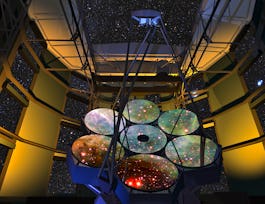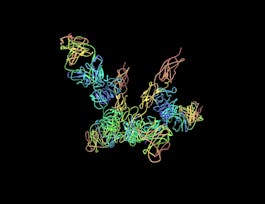Have you ever wondered what it would take for humans to travel beyond the comforts of our home planet, Earth? You are invited to join us in Space Medicine - an online experience facilitated by two recent Duke graduates in which you will learn about and engage in the most pressing medical challenges facing NASA and others advancing the future of space exploration.



(446 reviews)
Recommended experience
What you'll learn
Examine the mechanisms that allow certain organisms to overcome impossible odds to survive in a difficult environment.
Analyze the ways in which Oxygen, pressure, acceleration and other sustained threats impact the human body in extreme environments.
Explore mechanical, biomedical, and electrical engineering problems involved in space travel and potential solutions.
Skills you'll gain
Details to know
6 assignments
See how employees at top companies are mastering in-demand skills

There are 6 modules in this course
The field of space medicine arose from aerospace medicine in the mid 20th century. Owing the heritages of space and medicine, we will want to look back in history to find how these two disciplines came together. Along the way we will talk about case studies, which punctuate each week of the course, look at the role of flight medicine, before turning to the environment of space. Space is an inhospitable place, but venturing beyond Earth is not hopeless. Already some organisms have overcome problems posed by lack of air, freezing temperatures, and radiation. Space medicine is all about meeting these challenges and preventing problems before they occur in our final frontier.
What's included
7 videos2 readings1 assignment2 discussion prompts
A commonly understood fact is that breathing is difficult at high elevations because of the thin air. However, the meanings behind “hard to breathe” and “thin air” are often hidden or under-appreciated. Informed by a hot balloon incident from the 1800s, we will ask why oxygen is so important for the human body and appreciate how our hearts, lungs, and blood is essential for sustaining life. Then we will look at what happens when these processes break down including medical signs and symptoms to answer what happened hundreds of years ago. Finally, we will look at countermeasures and ways that humans overcome the threat of hypoxia in aerospace and space travel.
What's included
5 videos1 assignment1 discussion prompt
Scuba divers know that the end of the dive can be the most dangerous because bubbles can form causing terrible damage. Decompression Sickness was first understood in French coal miners but plays a crucial role in aerospace applications. The space environment involves moving between pressure gradients which brings these risks front and center. The other concern with different pressure gradients is hyperoxia where too much oxygen can also cause trouble. The artificial atmospheres onboard the International Space Station and in space suits must be tightly controlled to avoid these issues.
What's included
7 videos1 reading1 assignment1 discussion prompt
Aircraft causalities almost always end with a crash. Crashes are a form of acceleration where a moving plane comes to a rapid stop causing massive trauma for the pilot and passenger. Acceleration from high speed turns, maneuvers, and lift-off can contribute to pilots passing out and losing control of their craft. We fight against these G-Forces with blood pressure in the hopes of avoiding these Losses of Consciousness and Trauma.
What's included
6 videos1 reading1 assignment1 discussion prompt
Once we leave Earth, we lose so many of the protections that keep us safe. With the strong presence of Earth's gravity, our eyesight begins to fade, our bones start to crumble, and our muscles will atrophy. The atmosphere and magnetosphere shield us from solar radiation and we leave behind most of our social connections on board a spaceship. To survive a journey to Mars, Space Doctors will need to be in constant communication with astronauts and plan the mission knowing these risks. The journey may be perilous but we can engineer solutions to persevere and overcome.
What's included
5 videos1 assignment1 discussion prompt
Should astronauts prevent all of the issues needed for a trip to the Red Planet, there will be new health concerns to live on Mars. This week is especially theoretical as we look into engineering and medical designs to survive in an incredibly limited environment. Scarce resources also pose ethical concerns as some equipment may need to be left behind at the start of a mission and a Martian parasite could risk the extinction of the human race. However, like every issue throughout this course, once we've identified an issue, we can overcome it! We leave you, asking, "Do you have what it takes to be an astronaut?"
What's included
5 videos1 assignment1 discussion prompt
Instructors


Offered by
Why people choose Coursera for their career




Learner reviews
446 reviews
- 5 stars
82.07%
- 4 stars
14.60%
- 3 stars
2.21%
- 2 stars
0.66%
- 1 star
0.44%
Showing 3 of 446
Reviewed on Feb 12, 2024
Fantastic course. Such a breadth of information, with great practical case studies and very useful guest speakers who really brought alive the topic. Thank you.
Reviewed on Jan 17, 2022
Interesting overview of Space medicine with some good introductions to the major considerations for human presence in flight and in space.
Reviewed on Nov 15, 2022
It was really interesting and fascinating journey diving into so specific and difficult areas as space and diving medicine areas. Appreciate creators enthusiasm creating this amazing course!
Recommended if you're interested in Health

University of Arizona

University of Copenhagen

University of Florida

University of California San Diego

Open new doors with Coursera Plus
Unlimited access to 10,000+ world-class courses, hands-on projects, and job-ready certificate programs - all included in your subscription
Advance your career with an online degree
Earn a degree from world-class universities - 100% online
Join over 3,400 global companies that choose Coursera for Business
Upskill your employees to excel in the digital economy


